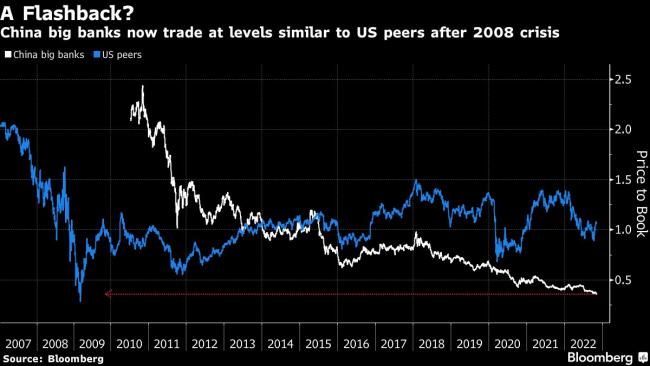(Bloomberg) -- Pessimism about China’s banking sector has plunged to an unprecedented level, even reaching the depths where US lenders traded during the 2008 financial crisis.
The four biggest lenders, including Industrial & Commercial Bank of China (OTC:IDCBY) Ltd., are priced at near record low valuations of about 0.4 of their book value in Hong Kong after a sector index weakened to an 11-year low. That depressed level roughly matches where investors priced JPMorgan Chase & Co. (NYSE:JPM) and Bank of America Corp (NYSE:BAC). among others during the depths of the 2008 crash.
They are far from the same perils that hit US lenders at the height of the financial crisis. But the banks’ recent swoon reflects both a broad market selloff and growing concerns about bad debt as lenders have been called on to backstop the flagging economy. Bank earnings have been steady so far, fueled by a jump in new loans, but they face growing risks from the nation’s Covid Zero lockdowns and a property crisis that shows no signs of easing.
“While we haven’t yet witnessed any signs of a structural deterioration in the domestic economy, it’s likely to remain under pressure in the next few years amid a global recession,” said Shen Meng, a director at Beijing-based investment bank Chanson & Co. “Banks would be more stressed if they can’t recover the loans by then.”
On top of that, the tightly controlled Chinese state-owned lenders have been perennial underperformers, and now are weighed down further as President Xi Jinping pushes for more “common prosperity.” The world’s second-largest economy is expected to grow just 3.3% in 2022, below government guidance of about 5.5%.
At direction of Beijing, lenders including ICBC and China Construction Bank (OTC:CICHF) Corp. have aggressively expanded credit this year to private enterprises and areas such as infrastructure. The biggest state banks have also beefed up support for the property sector, planning to extend at least $85 billion in net financing in the final four months of the year.
Xiao Yuanqi, a vice chairman at China Banking and Insurance Regulatory Commission, said earlier this month that their exposure to the real estate sector is at a “reasonable” level of 26% of their overall loan book, with the majority in high quality home mortgages.
But the risk lies in whether the property sector’s woes will spread more broadly in the economy, which could cause loan losses to grow further. The property sector drives about 28% of China’s gross domestic product.
“That makes Chinese banks prone to any increase in risks associated with the GDP growth,” said Nicholas Zhu, a vice president and senior credit analyst at Moody’s Investors Service. “Their net margins could further narrow as banks plan bigger provisions for bad debt and continue to cut loan rates to support the economy.”
Country Risk
Analysts at Bloomberg Intelligence said it will be hard for the banks to achieve any quick turnaround in their shares.
Bank stocks have staged a small rally this month amid speculation China is preparing to scale back its strict approach to Covid Zero as costs to the economy mount. An official over the weekend rebutted that any easing was in the works, vowing to “unswervingly” stick with Covid Zero.
That means banks are also paying the price in the markets for their country’s policies. Shares of China’s five state lenders, including ICBC and CCB, indicated an average 26% country risk premium in late October, compared with a single-digit reading implied in US peers, according to data compiled by BI analyst Francis Chan.
“Valuation prospects could only stabilize on a reversal of market perceptions around China’s country risk,” Chan wrote in a Nov. 3 research. The shares have decoupled from “uninspiring but stable” earnings, he said.
Their resilience will be tested further should the property market fail to stabilize, Fitch Ratings Inc. said in a recent research report.
“What matters more is not how much of a risk there might be for banks today, but rather where the property market is going in the long run,” said Grace Wu, senior director for financial institutions at Fitch, by phone. “If the property market remains sluggish for much longer it will certainly impact demand and quality of other loans.”
The pessimism implied in Chinese bank shares may present a long-term buying opportunity, according to DBS Group (OTC:DBSDY) analyst Lu Manyi, pointing to that some lenders reported lower non-performing loan ratios in the property sector in the third quarter.
The question remains how long it will take before that bet pays off.
“We are yet to see the turning point of the property sector,” said Lu. For bank shares “the short-term volatility will remain before we see more signals of a recovery of the China property sector and economy.”
